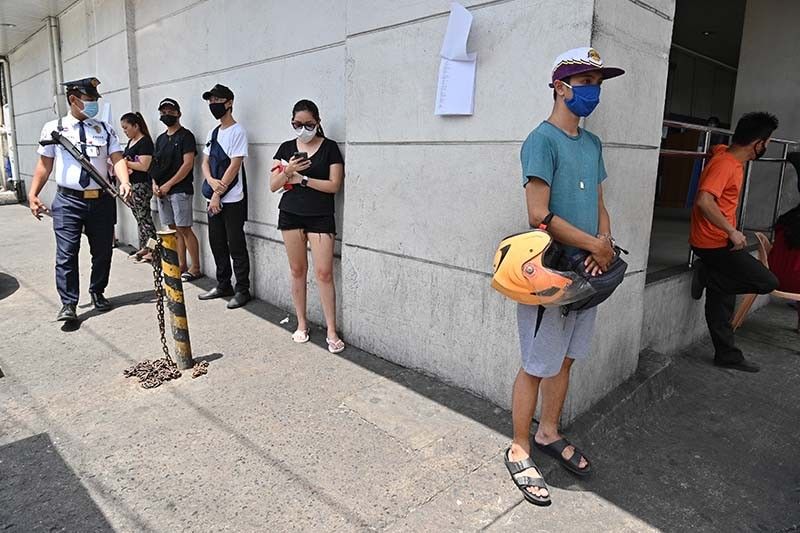Coping in quarantine: Lifelines in a society on forced isolation

Part 2 of a two-part feature. Read Part 1 here.
MANILA, Philippines (Updated June 2, 2020 6:08 p.m.) — Experts project that the end of COVID-19 pandemic is still far off even if there is hope of a vaccine by 2021.
“In any challenging situation—be it a pandemic, a natural disaster or a personal problem, there is always that immediate sense of feeling overwhelmed or not knowing what to do,” psychiatrist Aileen Nepomuceno said.
Simply put, when thrust into a situation like a pandemic, “we either buckle down and succumb or we figure out how to survive,” she added.
Knowing COVID-19 as part of battle
Not all feelings of anxiety are necessarily detrimental to one’s health as a “certain amount of caution” may be essential in surviving the pandemic, she added.
“That’s when wearing a mask, frequent hand washing, sanitizing and social distancing become behaviors, and, later on, good habits that we as a community should continuously engage in, instead of meeting them with resistance,” she said.
Dr. Pamela Jean Pascual, also a psychiatrist, said arming one’s self with knowledge about the coronavirus will help in understanding why stringent health protocols are enforced, which may help manage anxiety.
In the Philippines, the government has started easing health protocols and slowly opening up the economy and business and allowing vehicles to ply the roads.
But mass gatherings are yet to be drawn into the country’s picture of a "new normal". The same goes for dining in at restaurants as well as parties or festivals, concerts and leisure travel.
Keeping ‘in touch’
A future where gatherings may be limited to only ten attendees hit Filipinos differently since many are fond of “salu-salos” or “pangangapit-bahay,” Nepomuceno said.
"Can you imagine celebrating Christmas Eve via Zoom?"
Keeping in touch with loved ones is done differently now. Pascual pointed out: “With the advent of technology and social media, an alternative to face-to-face interaction is to send out text messages, phone calls or online video calls to other people we want to be connected with.”
If you can’t visit your parents or grandparents due to travel restrictions, Nepomuceno said, “have someone teach them to use a cellphone or tablet for video calls."
Finding a ‘lifeline’ in everyday things
Adjustment to a new way of living is a process, and every person is on a different timeline of adapting. “We have different ways of pacing ourselves and managing how we handle the effects of the ‘new normal’ concept,” Pascual explained.
Pascual encouraged developing a schedule or routine, or finding a new hobby "which can help them seek enjoyment in the midst of a pandemic situation."
*Marianne, who has general anxiety disorder and Attention Deficit Hyperactivity Disorder, said that since the lockdown, she has found time to things she liked doing to cope.
“I’ve been reading a lot, trying different exercises, getting my dose of pop culture,” she said.
Korean pop culture or the Hallyu Wave was a lifeline for her. “I’m so happy that South Korea is handling the virus well and there’s a lot of content coming from my favorite K-pop artists. I truly would be so down if I didn’t have K-pop content!”
Focusing on things you can control
"The fundamental principle in CBT or Cognitive Behavioral Therapy, which is one of the recommended treatments for depression and anxiety, is to focus our thoughts on what we can control," Nepomuceno meanwhile said.
She recommended taking charge of one’s choices: “It is a decision to live in fear or to live with fervor.”
“A growth mindset will look at this pandemic as something we would have to contend with for now but not without hope or passion,” she added.
Nepomuceno meanwhile said that this mindset introduced the country to “people in social media celebrating birthdays on Zoom, cooking like chefs, or turning into prayer warriors.”
"At a time like this, our mindset can save us," she added.
Seeking professional help
As the public continues to adapt and go on with the “new normal,” it would help to keep feelings “in check.”
“If you are having a hard time and you feel that you need to talk to mental health professional, do not hesitate to seek consultation,” Pascual said.
"This could be a way for people experiencing such difficulties to ask for help and our way as mental health professionals to reach out and restore what they felt was needed for their mental health in return," she added.
Like everyone else, Marianne said the “new normal” seems fairly uncertain.
“I’m still gonna stay at home until God knows when,” she said.
"My job is stable and my employer has been reassuring us, and there are a lot of opportunities coming up as well, so that will help ease my worries," she added.
Meanwhile, Marianne will keep up with monthly consultations with her psychiatrist and continue to consume content from her favorite K-pop artists to tide her over some days.
“I'm hoping that everyone doesn't get too complacent about not getting sick, seeing that we're all on our own here," she said.
"We can only do so much though, and I'm thankful that not getting the virus is the only thing my family is worried about and nothing like putting food on the table or paying for bills and stuff. I can only hope for the least of us to get protection and support," she added.
Editor's note: In response to this story, Project Listen by Coach Tine has offered services for those who are in the same boat as “Marianne” and need someone to talk about their anxiety, panic and depression. Coach Tine said “Marianne's" may reach out through Facebook.
- Latest
- Trending
































